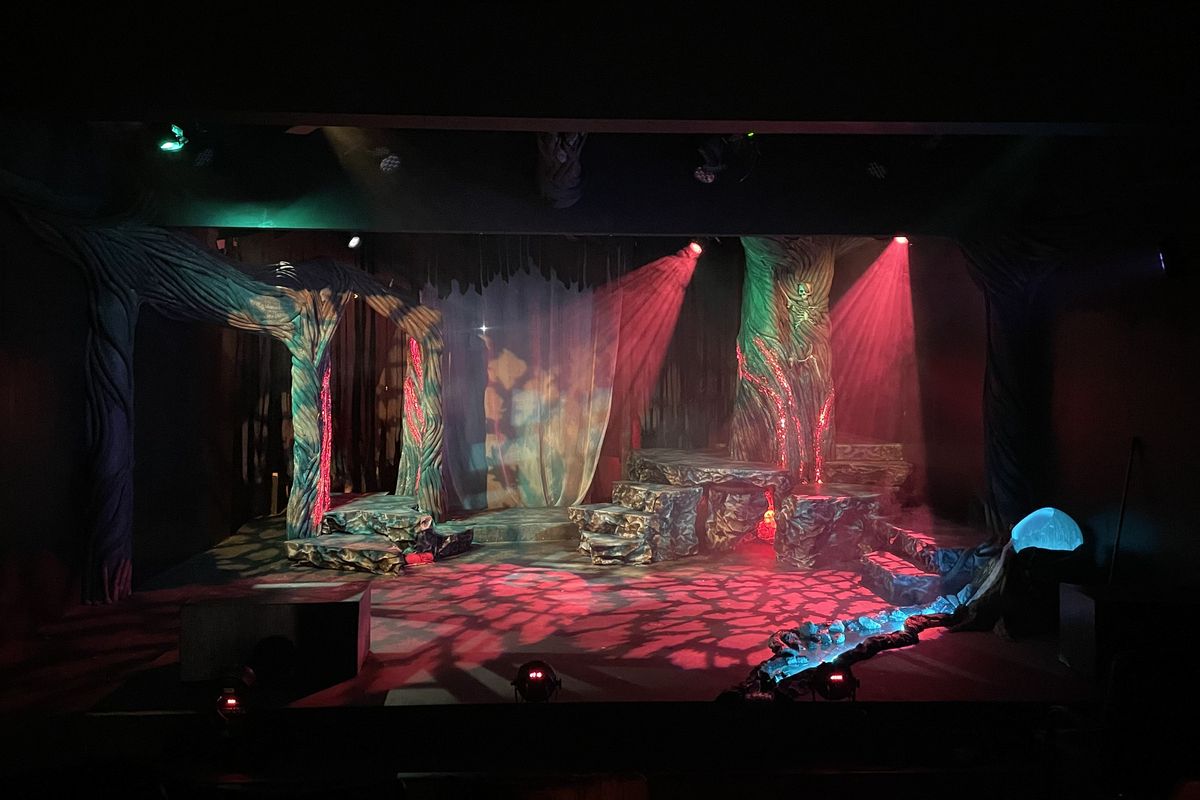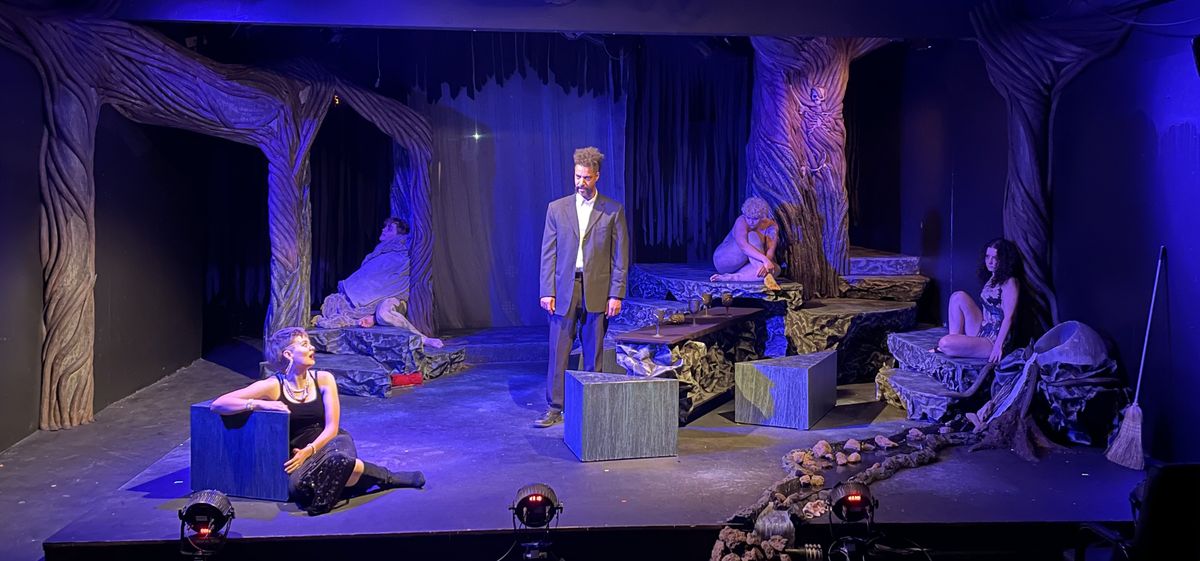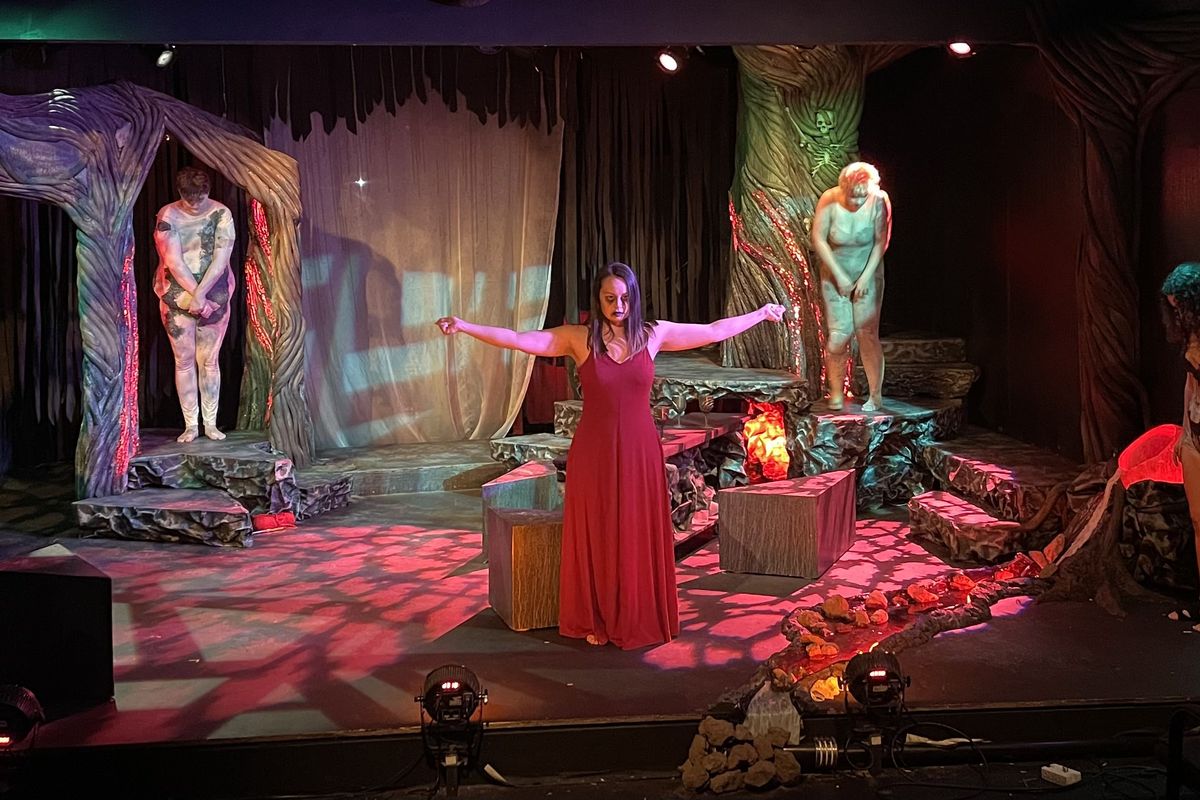‘Something wicked this way comes’: Audiences called to internally reflect on ‘compulsiveness’ in Nike Imoru’s retelling of Shakespeare’s ‘Macbeth’ at Stage Left Theater
The cast of "Macbeth," with Matt Slater as Macbeth, center, rehearses at Stage Left Theater. The production runs through Oct. 27. (Courtesy of Jeremy Whittington)
Before Nike Imoru signed on to direct a William Shakespeare play at Stage Left Theater, she had just one condition. She got to choose the play.
Jeremy Whittington, former managing/artistic director of Stage Left, and Alana Shepherd, newly announced interim managing/artistic director, had no problem with that arrangement.
“As soon as I heard ‘Macbeth’ and Nike, I was on board,” Shepherd said.
“Macbeth” was the first Shakespeare text Imoru studied as a high school student in east London. She remembers being captivated by the realization that the breadth and depth of the emotions she experienced as a teenager could be that big in art.
“Therefore I felt they could be that big in me, at a time when it probably wasn’t comfortable or appropriate to have or express big emotions,” she said.
“Macbeth” opens Friday and runs through Oct. 27 at Stage Left Theater.
The play opens on three witches (Sarah Plumb, who also plays Macduff’s son and a gentlewoman, Matthew Pope and Cecilia Sutton), who have prophecies for Macbeth (Matt Slater) and Banquo (Steve Lloyd), both generals in the army of King Duncan (Kevin Connell, who also plays Old Siward).
The witches tell Macbeth that he will one day become the Thane of Cawdor then the king of Scotland and that Banquo will father kings but not become one. The men are confused as the witches disappear, but when another Thane tells Macbeth that he has just been crowned the Thane of Cawdor, Macbeth jumps from skeptical to all-believing, knowing that one day, he will lead Scotland.
Overwhelmed with that ambition, Macbeth alerts his wife Lady Macbeth (Lani Call) of the prophecies and that the king has decided to spend the night at their castle. King Duncan also declares his son Malcolm (Preston Loomer) to be his heir.
Lady Macbeth convinces Macbeth that he needs to kill the king that night so Macbeth can take the throne. Macbeth does so, but is immediately overcome with guilt and paranoia. More death follows as Macbeth tries to hold onto the crown and avoid suspicion, with Lady Macbeth following her husband down a paranoid path.
“Macbeth” also features Dan Anderson as Macduff and Dana Sammond as Lady Macduff.
Joy Simmons is the production manager, with stage management from Lizzy Kitzig, Holland Jones and Jobie Lynch. The show features scenic design from Whittington and James Landsiedel, and lighting design by Shepherd. Bryan Durbin was the fight choreographer.
During her time in school, Imoru learned how to read and analyze Shakespeare, how to look at the character development and the history of the play. The cast of Stage Left’s “Macbeth” got the same opportunity to dive deep into the material during the three months of training Imoru hosted at her studio in Airway Heights.
As an ensemble, the cast worked to embody and love the language of Shakespeare while also making it more accessible.
“Yes, it’s rich, and there are some parts that are dense and not understandable, but that could be the same with a really good TV show where you’re following the plot,” Imoru said. “They’ve come to love it and own it and make it theirs.”
Imoru also gave the cast opportunities to learn about themselves during the process of staging “Macbeth” through what she calls dedicated actor time that involves mindfulness practices around the body, the mind and the nervous system.
Actors are often thought to simply memorize and recite lines, Imoru said, but being a top-level actor and working with top-level actors is another east that requires deep active training. Cast members might arrive early to rehearsal to meditate, for example, in preparation of working together.
“They come in at 6 p.m., 6:30 p.m. to power down in order to lift up,” she said.
Without giving any spoilers away about the set, the cast and crew have got a beautiful space in which to meditate before getting into the darker themes of “Macbeth,” themes Imoru and Shepherd feel resonate to modern audiences, like all-consuming ambition, no matter the cost.
“We look at it in terms of what makes a person want and then what makes a person want more?” Imoru said. “There’s a yearning for everything and if we’re in our own space of yearning, at what point does that yearning escalate and seem completely reasonable?”
“You always have to ask yourself the question, if it’s fated to be, why force it?” Shepherd said.
“There’s something compelling in that compulsiveness and those are the things I’m drawing out, rather than judging Macbeth and what he does,” Imoru said. “There is an element of that. It’s this compulsion. Is it within you? How does it show up?”
Imoru hopes her production of “Macbeth” leads to a lot of internal reflection for audience members. An introvert in an extroverted culture, Imoru said she has a lot of internal space because she doesn’t seek what she needs from the world.
“I’m inviting the audience to do the same,” she said. “They’re watching, and they might have a wow moment or a relatable moment, and they can’t get up and talk about it or tweet about it. They’ve got to be with it inside themselves, but in community, so it’s safe.”



